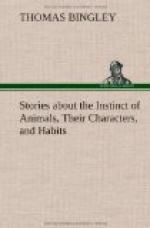CHAPTER VII.
Uncle Thomas tells about the Migrating Instinct of Animals.—Of the House Swallow of England; and the Esculent Swallow, whose Nest is eaten by the Chinese.—He tells also about the Passenger Pigeon of America; of the Myriads which are found in various parts of the United States; of the Land-Crab and its Migrations, and of those of the Salmon and the Common Herring.
“Uncle Thomas, I heard to-day of a swallow which for many years returned to the same window, and built its nest in the same corner. Now as I believe swallows are birds of passage, and leave this country to spend the winter in warmer climates, I wish you to explain to me how it is that they can return from such distances to the same spot.”
“That is a question, Frank, which I cannot very well answer, but so many instances of the kind have been observed as to leave no doubt as to the fact. It has sometimes been known even to penetrate into the house, and attach its nest to articles of furniture.
“At Camerton Hall, near Bath, a pair of swallows built their nest on the upper part of the frame of an old picture over the chimney; and, coming into the room through a broken pane in one of the windows, they continued to use the same place for their nest for three successive years, and would probably have continued to do so, but the room having been put into repair, they could no longer obtain access to it.”
“Is it want of food which makes birds migrate, Uncle Thomas?”
“Principally, I should say that it is so, Frank, but in shifting from one place to another they only fulfil an instinct impressed on them by their Creator for the preservation of their species. Thus, for instance, an old swallow might know by experience, that when its food fails here, it begins to become plentiful elsewhere, but the young bird which had never been more than a few miles from the place where it was hatched, can have no such experimental knowledge; yet, when the season arrives, we find the whole flock ready to set out. I dare say you have all seen them, Boys, gathering in flocks and resting on the house tops, as if taking breath before setting out on their long journey.”
“Oh, yes, Uncle Thomas, I have often seen them doing so, but I have heard that they dive to the bottom of lakes and ponds, and remain there till winter is over.”
“Many foolish stories are told of swallows being found in such situations, Harry, but they are now well known to be fables. There is no doubt that they migrate in the same way as many other birds. Last autumn I watched with great pleasure the movements of a flock, which was evidently preparing for their arduous flight.




